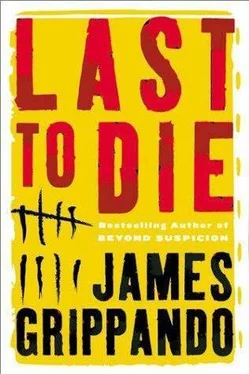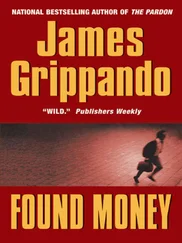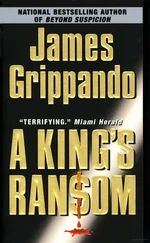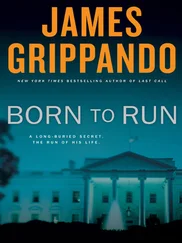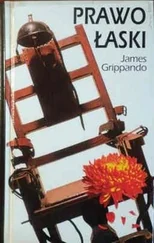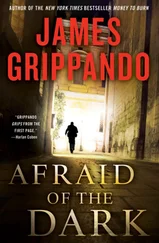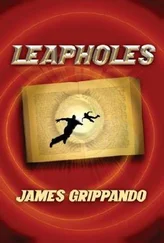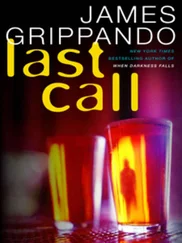“What’s your name?”
“Kamun.”
“How old are you?”
“I don’t know,” he said.
“Do you want some water?”
“Yes.”
They stopped, and she let him drink from her canteen.
“Thank you.”
She smiled and patted his head. “You’re welcome.”
At the end of the dusty trail was the Children First clinic, which didn’t look like much of a clinic. It was one of the older buildings in the neighborhood, thick walls of mud-brick and an adobe-style roof. But it did have a noisy air-conditioning unit sticking out the window, which seemed to delight the boy.
“Cool,” he said, smiling.
“Yes. It is. Come inside.”
He followed her in, and she closed the door behind him. He seemed nervous again, so she took him by the hand and let him stand directly in front of the A/C and turned it on full-blast. He smiled, even laughed a little as the cold air dried the sweat on his brow.
Through the holes in his shirt she saw scars across his back, and she wondered how long it had been since he’d laughed like this.
“Come in here,” she said. She took him into the other room-there were only two-and sat him on the examination table.
“I want to listen to your heart,” she said. She placed the stethoscope on his knee and listened.
“I don’t hear your heart,” she said.
Finally, he laughed. “That’s not my heart,” he said.
“Oh, I’m sorry.” She put it on his elbow.
He laughed again, and she laughed with him. But if he thought this routine was funny, he was probably younger than she’d guessed. She placed her stethoscope on his heart and listened.
“Good strong heart,” she said.
“Yes. That’s what Le Gros said.” Le Gros-the Big Man.
“Is that who you worked for?”
“Yes.”
“How long?”
“Six.”
“Months?”
“No. Harvests.”
Rene had been around long enough to know that most cocoa farms had a main harvest lasting several months and a mid-crop harvest lasting several more. Six harvests meant that Kamun had been working almost three years straight.
It’s not going to be easy to get this boy home.
“What did you do there?”
He didn’t answer, which was to be expected. It generally took them a while to warm up.
“May I take your shirt off?”
He shook his head.
“I noticed some marks on your back. I just want to take a look.”
He folded his arms, refusing.
“It’s okay. We can do that later.”
She paused, then prepared herself to ask the one question she always asked. She knew the answer she’d get, talking to a child who’d never known a home with milk and sugar in the cupboard. But she asked anyway, hoping the answer would help her see purpose in her work and strengthen her resolve, hoping that it wouldn’t simply dampen her spirits and break her heart.
“Kamun. Have you ever tasted chocolate?”
“Chocolate?”
“Yes, chocolate. Have you ever tasted it?”
He shook his head. “What is…chocolate?”
The main door opened, and a man and woman entered. “Post” they said with their usual cheery smiles.
Rene quietly assured Kamun that they were friends. It was Jim and Judy Roberts, nonmedical volunteers who ran the administrative side of Children First’s operation. Rene had liked them from day one on the job, a couple of down-to-earth Oklahomans who didn’t do charity just to get their mugs in the society pages and who’d found a meaningful way to spend their retirement together. They were back from their daily jaunt to the post office, Jim the former Iowa State football player having led the way. Rene stepped out of the examination room and asked, “The usual?”
“No,” said Mr. Roberts. “There’s actually something here for you today.”
“Really? Put it on the desk. I’m with a patient.”
“It’s from a lawyer,” he said.
That piqued her interest. She crossed the room and took a look. She didn’t recognize the name.
“Who’s the boy?” asked Mrs. Roberts.
“Sorry?” said Rene, still focused on the envelope.
“The patient. Who is he?”
“His name is Kamun. I’ll introduce you in a minute. This looks kind of important. Maybe I should open it.”
Mr. Roberts handed her an opener. She quickly sliced the envelope from end to end, then removed the letter. It was one page long. Her eyes shifted from left to right as she read, then her lashes fluttered and her hand began to shake.
Mr. Roberts asked, “Is everything okay, Rene?”
Instinctively, she brought a hand to her mouth. “It’s my sister,” she said.
“She’s okay, I hope.”
Rene looked up from the letter and said, “She’s dead.”
Mrs. Roberts came to her, put her arm around her. “Oh no.”
Rene lowered herself onto the edge of the desk, the quickest place to sit down. “She was shot. A robbery or something. They don’t know exactly. In Miami.”
Mr. Roberts took her hand. “I’m so sorry, honey.”
Mrs. Roberts said, “She was such a sweet girl. I mean, it seems like she was just here with us.”
“It’s been over two years since she left.”
“Really? That long? Oh, time flies. But she was still so young. I think I’m going to cry.”
“Please, don’t,” said Rene.
Mr. Roberts glanced at his wife, as if telling her to be strong for Rene. She cleared her throat and quickly toughened her resolve.
“Thank you,” said Rene.
Mr. Roberts grimaced and said, “She really was such a nice person.”
“Would you like a minute alone?” asked Mrs. Roberts.
“I’ll be fine, really. But thank you both. It’s kind of you to say such nice things.”
Mrs. Roberts said, “We can arrange for some time off, if you would like.”
“I don’t expect I’ll be going anywhere.”
“It’s no problem, if you want to go home.”
“Sally was the only family I had left. Now she’s gone. There’s nothing to go back to.”
The older woman smiled flatly, as if she were trying to understand. “It’s up to you, dear. Whatever you want to do.”
Rene returned a sad smile, then started back to the examination room. She stopped in the doorway, then turned and looked at both of them. “I don’t want you or the organization to be at all worried about me. I’m not going anywhere.”
“Like we said, Rene. It’s totally up to you.”
With a final nod, she tried to convey that this would be the end of the matter. Then she stepped into the examination room and turned her attention back to Kamun.
At noon on Thursday, Jack took Sally Fenning’s ex-husband to lunch.
He’d spent the morning in court at the Criminal Justice Center, so they met just a few blocks down the Miami River at the Big Fish Restaurant, one of Jack’s favorite lunch spots. For all its miles of breathtaking waterfront, Miami offered amazingly few places that actually allowed you to sit by the water and eat seafood. The Big Fish was right on the Miami River, nothing fancy, just a relaxing place to score fresh dolphin, tuna, or shrimp ceviche while soaking up a historic stretch of river where ninety-foot yachts bound for the West Indies shared the right of way with rusted old container ships filled with stolen SUVs destined for South America. It was a landmark of sorts, a piece of old Miami where mariners from houseboats at the west end of the river sidled up alongside bankers and lawyers from the office towers to the east, where the mouth of the five-and-a-half-mile river emptied into Biscayne Bay. Jack was sentimental about the place, too. It was over broiled grouper and french fries that, as a federal prosecutor, he’d talked his first mobster into testifying for the government.
Читать дальше
